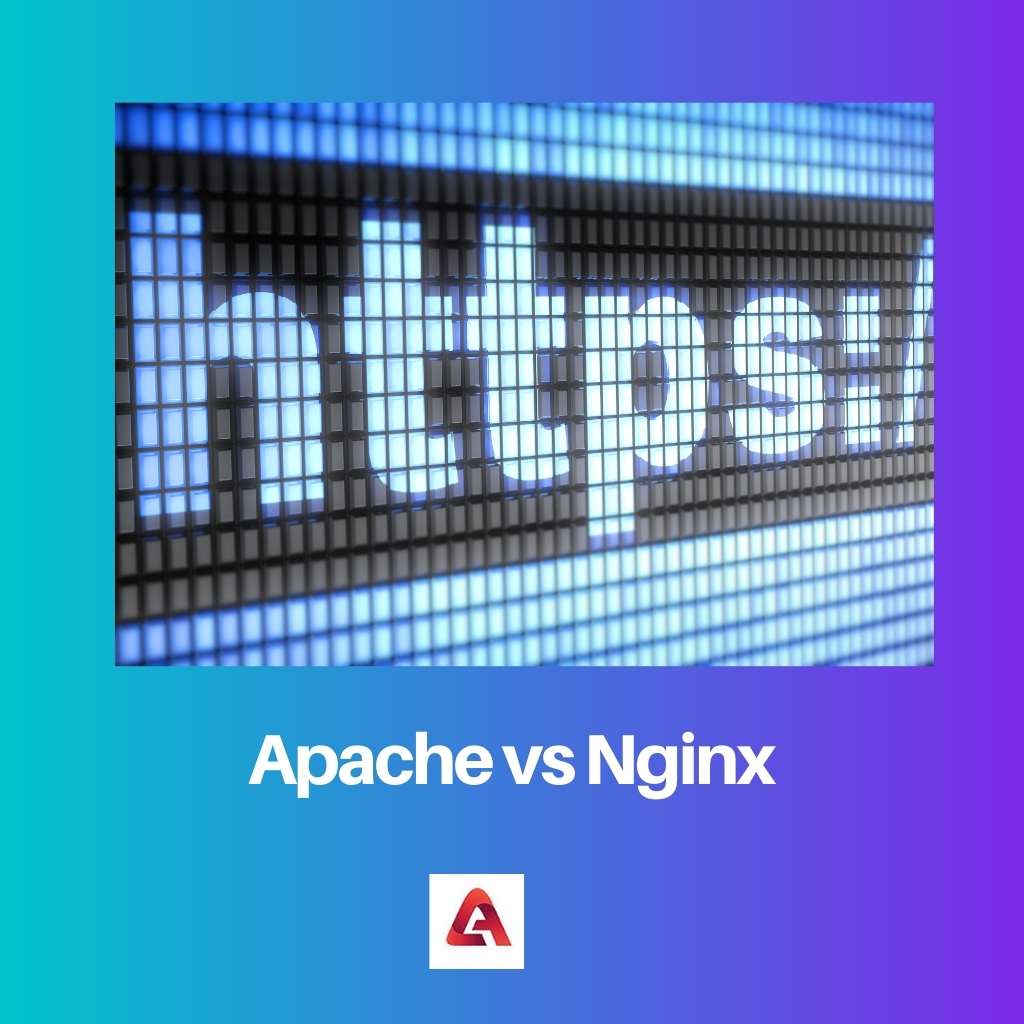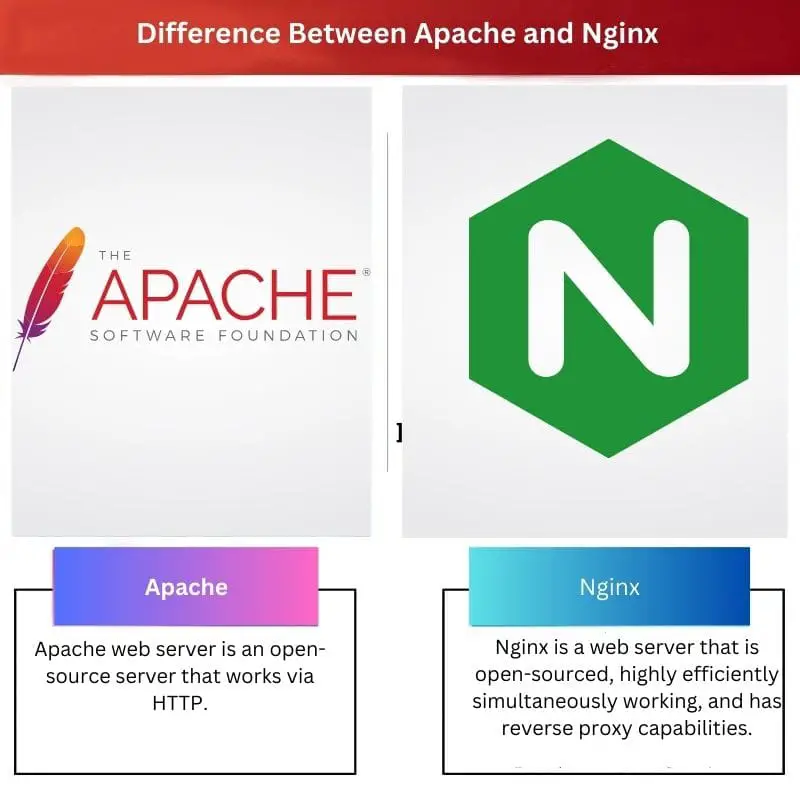For big tech companies and users, a web server makes a very important part of the internet community.
A web server, like Apache or Nginx, is a software and a hardware device, a computer that has some underlying information stored in it such as a website’s component files.
Key Takeaways
- Apache is a versatile and widely used web server, while Nginx is a high-performance reverse proxy server.
- Nginx provides better performance and scalability than Apache, especially under high traffic loads.
- Apache offers flexibility and a broader range of modules, while Nginx focuses on speed and efficiency.
Apache vs Nginx
The difference between Apache and Nginx is that Apache is an open-source web server that has certain limitations in handling requests as a load on it whereas NginX is high in performance besides open-sourced and has almost no limitations on request loads. Nginx is more efficient as compared to Apache.

Apache is a web server that works under HTTPS protocols. It is open-source and serves the content through HTTP which loads web pages under Hypertext protocols.
It is architectured in multi-threaded designs and has a lot of limitations under load requests. Apache handles almost seventy percent of the web.
Nginx is a web server that has more flexibility besides Apache. It is an open-source server and is high in performance, works in a private theme, and is accessed fast.
Nginx is also capable of acting in reverse proxy servers in addition to server capabilities. It handles the load requests faster and efficiently.
Comparison Table
| Parameters of Comparison | Apache | Nginx |
|---|---|---|
| Capabilities | Apache web server is an open-source server that works via HTTP. | Nginx is a web server that is open-sourced, highly efficiently simultaneously working, and has reverse proxy capabilities. |
| Performance | Apache lacks and works slow when multiple load requests are put on the server and becomes less in performance. | Nginx is a high-performance web server and handles requests and loads simultaneously. |
| Memory storage | Apache takes and consumes more storage in the memory. | Nginx is very efficient and takes up significantly low memory spaces. |
| Thread capabilities | Apache uses a single thread as a single sequential flow of data to take up a single connection. | Nginx has more thread capabilities to let a single thread hold and take several connections at a time. |
| Platform | Apache works well on all Windows platforms and Unix systems. | Nginx runs on all Unix systems but does not support all Windows platforms. |
What is Apache?
Apache is a web server that was developed under Apache Software Foundation in 1995. It is known as an Apache HTTP server that works under HTTPS protocols.
HTTP stands for Hypertext Transfer Protocol. Apache forms seventy percent of all the web pages on the internet and has a big sector of use.
Apache web server is good enough to run and access the maximum number of web pages through its advantageous features like compressing, decompressing, auto-indexing, compatibility, static file handling procedures, loading of dynamic modules, etc, but it lacks several features of a modern-like web server.
These include several limitations like single thread server that runs only one connection at a time, less performing capability and efficiency, it cannot handle multiple requests that are large as a load on the server and work slow, does not support additional features like reverse proxy configurations and asynchronous environment.
Apache HTTP web server consumes more memory than other modern servers which increases the load on the system.
When it comes to accessing the requests of the clients, Apache uses multi-module processing to handle them and web traffic and uses a lot more hardware devices to help. However, it’s good that Apache runs on major platforms.

What is Nginx?
Nginx, represented as Nginx and to be pronounced as Engine X, NGINX or NginX, was developed by Igor Sysoev in 2004. It was built as a very efficient web server that has several benefits over a normal web server like Apache.
Besides a web server built in an open-source way, Nginx was also capable of performing actions that meet reverse proxy configurations of a server.
The best thing about the Nginx server is that it can handle multiple client requests simultaneously and with limited devices. It thus stresses less load on the server and increases the efficiency of the server.
Nginx is more advanced than any other web server. It is also an open-source web server and has a synchronized environment that loads and accesses a large number of operations.
Nginx server is more advanced in the use of a thread.
It uses a single thread to join multiple connections. Moreover, NginX has all the capabilities of the Apache webserver except dynamic content accessibility and module compilation under the core itself.
Nginx server takes even less storage space unlike Apache’s and runs on all Unix systems. It has a disadvantage in that it does not support all Windows platforms. It is best suited for high-traffic websites.

Main Differences Between Apache and Nginx
- Apache webserver uses a multi-threaded approach to process requests whereas Nginx web server makes use of an event-driven approach that uses a response for all input applications by the user.
- Apache has a worse performance for websites under heavy traffic whereas Nginx performs very well and efficiently even on high traffic websites.
- Apache webserver loads and unloads modules directly in a dynamic way whereas NginX does not lead to dynamic loading of modules and they must be accessed within the core itself.
- Apache web server is made through programming languages C and XML whereas Nginx is made through C only.
- Apache is less in performance whereas Nginx is almost double in performance.

- https://www.diva-portal.org/smash/record.jsf?pid=diva2:1554073
- https://www.researchgate.net/profile/Sipiwe-Chihana/publication/329118749_Web_Server_Performance_of_Apache_and_Nginx_A_Systematic_Literature_Review/links/5bf691d0299bf1124fe55161/Web-Server-Performance-of-Apache-and-Nginx-A-Systematic-Literature-Review.pdf
